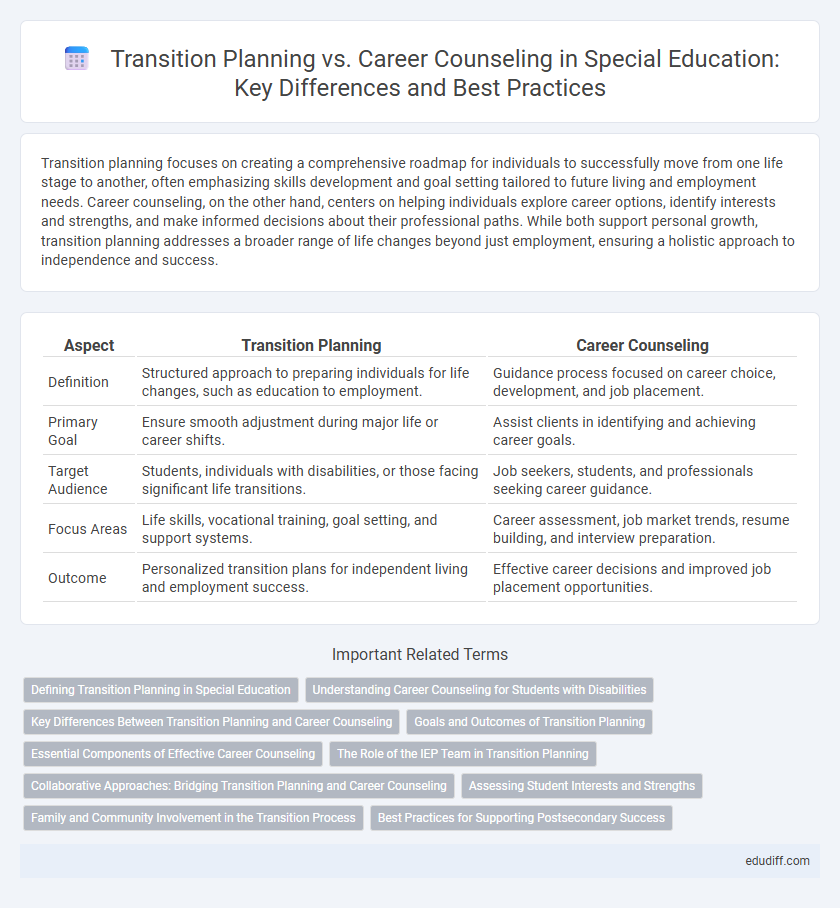Transition planning focuses on creating a comprehensive roadmap for individuals to successfully move from one life stage to another, often emphasizing skills development and goal setting tailored to future living and employment needs. Career counseling, on the other hand, centers on helping individuals explore career options, identify interests and strengths, and make informed decisions about their professional paths. While both support personal growth, transition planning addresses a broader range of life changes beyond just employment, ensuring a holistic approach to independence and success.
Table of Comparison
| Aspect | Transition Planning | Career Counseling |
|---|---|---|
| Definition | Structured approach to preparing individuals for life changes, such as education to employment. | Guidance process focused on career choice, development, and job placement. |
| Primary Goal | Ensure smooth adjustment during major life or career shifts. | Assist clients in identifying and achieving career goals. |
| Target Audience | Students, individuals with disabilities, or those facing significant life transitions. | Job seekers, students, and professionals seeking career guidance. |
| Focus Areas | Life skills, vocational training, goal setting, and support systems. | Career assessment, job market trends, resume building, and interview preparation. |
| Outcome | Personalized transition plans for independent living and employment success. | Effective career decisions and improved job placement opportunities. |
Defining Transition Planning in Special Education
Transition planning in special education is a structured process designed to help students with disabilities prepare for life after high school, including employment, postsecondary education, and independent living. It involves individualized goal-setting based on student strengths, preferences, and interests, ensuring compliance with the Individuals with Disabilities Education Act (IDEA) requirements. Effective transition planning integrates collaboration among educators, families, and community agencies to create a customized roadmap for successful adult outcomes.
Understanding Career Counseling for Students with Disabilities
Career counseling for students with disabilities involves personalized guidance tailored to their unique strengths, challenges, and goals, facilitating informed career decisions and skill development. Transition planning coordinates educational, vocational, and community resources to ensure a smooth progression from school to post-school activities, emphasizing independence and self-advocacy. Integrating career counseling within transition planning enhances outcomes by aligning individual aspirations with practical support and accommodations.
Key Differences Between Transition Planning and Career Counseling
Transition planning focuses on preparing individuals, especially those with disabilities or special needs, for successful movement from school to adult life, emphasizing skill development, community integration, and access to resources. Career counseling centers on exploring career options, identifying strengths, setting goals, and making informed employment decisions through assessments and guidance. Key differences include transition planning's broader scope involving educational, social, and life skills aspects versus career counseling's specific focus on career pathways and job readiness.
Goals and Outcomes of Transition Planning
Transition planning focuses on setting clear, individualized goals to support students with disabilities in achieving post-school success, including employment, education, and independent living. It emphasizes developing measurable outcomes through coordinated services that align with students' strengths, preferences, and needs. Career counseling, by contrast, primarily guides exploration of career options and skill development, while transition planning integrates these elements into a comprehensive roadmap for lifelong achievement.
Essential Components of Effective Career Counseling
Effective career counseling integrates personalized assessments, goal setting, and skill development to support successful job placement. It emphasizes ongoing support, realistic career exploration, and collaboration with clients to create actionable transition plans. Incorporating labor market information and fostering self-advocacy enhances client decision-making and long-term career satisfaction.
The Role of the IEP Team in Transition Planning
The IEP team plays a critical role in transition planning by collaboratively identifying student strengths, preferences, and post-school goals to develop a comprehensive plan tailored to individual needs. This team includes educators, parents, the student, and related service providers who work together to ensure that transition services align with career counseling and support successful employment or further education. Effective transition planning within the IEP framework fosters skill development, community integration, and long-term independence for students with disabilities.
Collaborative Approaches: Bridging Transition Planning and Career Counseling
Collaborative approaches enhance the effectiveness of transition planning and career counseling by integrating individualized strategies that address both academic and vocational goals. Professionals from education, counseling, and career services work together to create cohesive plans that support students' skill development and employment readiness. This synergy ensures comprehensive support, facilitating smoother transitions from school to postsecondary opportunities and meaningful careers.
Assessing Student Interests and Strengths
Transition planning emphasizes a comprehensive evaluation of student interests and strengths through personalized assessments and collaboration with educators, families, and students to develop tailored goals. Career counseling focuses on identifying specific career interests and aptitudes using standardized tools to guide students toward suitable career paths and educational opportunities. Both approaches prioritize understanding individual capabilities but differ in scope, with transition planning addressing broader life skills and career counseling targeting occupational decisions.
Family and Community Involvement in the Transition Process
Family and community involvement play a crucial role in transition planning by providing emotional support, resources, and advocacy to ensure smooth shifts from education to adulthood. Career counseling emphasizes collaboration with families and community organizations to identify realistic career goals and develop individualized plans that respect cultural and social contexts. Integrating family and community input enhances decision-making, increases student engagement, and fosters a supportive network for long-term success.
Best Practices for Supporting Postsecondary Success
Transition planning emphasizes individualized goal-setting and collaboration among educators, families, and students to create tailored pathways for postsecondary success, while career counseling focuses on skill assessment, labor market trends, and career exploration to align student interests with viable job opportunities. Best practices integrate both approaches by combining personalized transition plans with career development strategies, ensuring students with disabilities gain the necessary academic, social, and vocational skills for adulthood. Utilizing data-driven methods and continuous progress monitoring enhances the effectiveness of support systems that foster independence and employment readiness after high school.
Transition Planning vs Career Counseling Infographic

 edudiff.com
edudiff.com